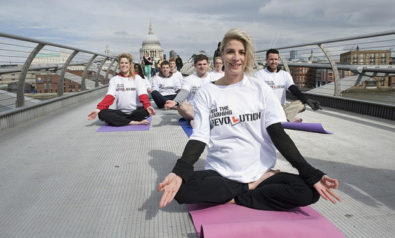Sri Sri Ravi Shankar discusses a new era of spirituality that is compatible with modern, western living.
Interview conducted by Aaron Prosser.
Question 1: It seems like more people are searching for inner peace and meaning in their life. This is especially true in the western world. Many westerners are drawn to India, in search of spiritual teachers like yourself. Why do you think this is happening?
Sri Sri: Well, the world goes through different phases in turn. There was an age of exploration several centuries ago, followed by an age of economy and industry, followed by technology and so on. I think we may well be entering the age of spirituality. When people become saturated by so many different kinds of experiences, even by various comforts, there is a quest to know something else, something deeper in life.
Question 2: What do you think spirituality is? What does it mean to live a spiritual life?
Sri Sri: Every person wants happiness, wants love. That is what spirituality provides. Spirituality is just living life to the fullest, living it as a celebration. Certain elements, if present, make life a fulfilling experience. Keeping healthy, knowing a little bit about oneself in some depth, spending some time with nature, living in harmony with it, caring for people around you, doing some service in whatever form etc. We find that all these aspects are part of ancient cultures all over the world. You don’t have to leave or sacrifice anything to have a spiritual life. You can be spiritually and materially abundant.
Question 3: In light of what you said, do you think it is possible for spirituality and business to co-exist? Can a person have one foot in the financial world, and the other in the spiritual world, so to speak?
Sri Sri: Of course. Spirituality gives you a deep sense of inner contentment and, as a result, you can discharge your duties and responsibilities much better. Financial prosperity in no way is an impediment to spirituality. As you become more and more spiritually fulfilled, you act more and more out of a sense of responsibility rather than a sense of greed or attachment.
Question 4: But we can imagine someone asking you something like this: from your teachings and your actions, it is clear that, for you, the only real values are human values. This means peace, equality, selfless service, and compassion. But for many in business and economics, the only real value is financial value. How do you think the financial world would need to change in order to see the value in human values?
Sri Sri: You may achieve financial value but if you gather a lot of stress and tension in the bargain, that affects your own health, your own peace of mind, your own relationships, then what’s the point? What are you gathering all the wealth for? An expensive bed is no good if you can’t sleep. Losing health to gain wealth and then spending that earned wealth to regain health doesn’t sound like good economics at all.
There is an old saying that says charity purifies wealth. If you give away a portion of your wealth towards some good cause, then that wealth brings you comfort, as well as merit. If you earn with a mindset to spend everything on yourself, then that wealth brings all sorts of tensions and troubles. Corporate social responsibility is a well known idea now all over the world. So, financial enterprises should participate in some way to make society around them better.
Question 5: Your Holiness, you hold teachings and seminars all over the world. Yoga and meditation are central to your teachings. Could you briefly describe what yoga and meditation are, and how they might be relevant to business owners and people working in the financial sector?
Sri Sri: Yoga and meditation and simple but very effective tools to keep yourself stress-free. A little practise regularly keeps you in touch with your inner depth. Apart from giving a very palpable sense of health and well-being, it helps you deal with situations and challenges much better. Your people handling skills improve. As you listen more and more to your inner voice for guidance, you are able to take decisions with a clearer mind and your intuition improves.
Question 6: This is very interesting. Before we end our conversation, I’d like to shift the discussion to your recent and second peace mission to Pakistan in March this year. Your first was in 2004.There is a long history of conflict and tension between India and Pakistan. Pakistan itself has suffered greatly from internal conflict the last few years from extremism and the Taliban. What was the purpose of this trip, and do you think your peace mission was a mission accomplished?
Sri Sri: The purpose of the trip was to establish a people-to-people contact on both sides. When you talk about India-Pakistan relations, usually the rivalry and tension is highlighted, especially in official and political interactions. But there is great love and goodwill among the masses on both sides. We have so much in common culturally. I was received with great affection everywhere I went and just after I returned, we hosted a delegation of about 300 pilgrims from Pakistan at our center in Bangalore. We teach in our programs to extend our hand for friendship first and we find it invariably works.
Question 7: In light of this, what words of wisdom do you have for to those, like you, who are looking for both inner peace, and for peace in the world?
Sri Sri: I would say, terrorism and violence exist as much because of the inaction of good people as the action of bad ones. Peace is not a phenomenon resulting from a fragile political arrangement. Peace is what dawns when you feel unshakable from within and at the level of society or community, it shows up as a genuine sense of belonging, caring and inclusiveness. This is the education that is needed for peace. Only those who are at peace within themselves can bring peace to the world.
The views expressed in this interview are the interviewee’s own and do not necessarily reflect Fair Observer’s editorial policy.
Support Fair Observer
We rely on your support for our independence, diversity and quality.
For more than 10 years, Fair Observer has been free, fair and independent. No billionaire owns us, no advertisers control us. We are a reader-supported nonprofit. Unlike many other publications, we keep our content free for readers regardless of where they live or whether they can afford to pay. We have no paywalls and no ads.
In the post-truth era of fake news, echo chambers and filter bubbles, we publish a plurality of perspectives from around the world. Anyone can publish with us, but everyone goes through a rigorous editorial process. So, you get fact-checked, well-reasoned content instead of noise.
We publish 2,500+ voices from 90+ countries. We also conduct education and training programs
on subjects ranging from digital media and journalism to writing and critical thinking. This
doesn’t come cheap. Servers, editors, trainers and web developers cost
money.
Please consider supporting us on a regular basis as a recurring donor or a
sustaining member.
Will you support FO’s journalism?
We rely on your support for our independence, diversity and quality.







Comment
Quite an engrossing interview. I could feel the peace within when he talked about peace between India and Pakistan. And as He says, when we are peaceful within, the same peace prevails outside in a community and also between different communities, religions, caste, creed, culture and even countries.